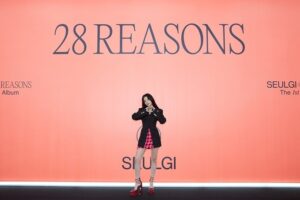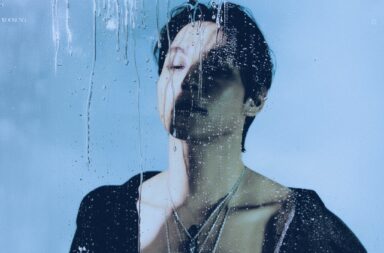Seulgi‘s solo debut album, 28 Reasons, accomplishes a rare feat: it genuinely sounds like nothing else out there, yet the album unmistakably bears Seulgi’s artistic stamp. This is a bold claim in the ever-shifting tides of K-pop, but it is well-founded by ingenious production on the part of SM Entertainment, infused with Seulgi’s own hauntingly elegant artistic signature. The result is a gorgeously wrought album that will likely be influencing the Hallyu soundscape for seasons to come.

28 Reasons harnesses and builds off of some of the most compelling elements of her past work with Red Velvet and bandmate Irene. The album, and most especially the title track, is playfully mysterious–a vibe that is difficult to execute, but succeeds in spectacular fashion here, playing into the autumnal tendency to release dark and moody music akin to past hits “Monster” and “Psycho.” The album production, however, skews in a slightly different direction than those releases.
What stands out immediately is 28 Reason‘s use of negative space, or, in other words, the seeming lack of action in terms of musical elements. For example, the minimal verses in the title track, pulsating with a distorted bass line and twinkling whistles, are perfectly tailored to spotlight Seulgi’s vocals and make the focus on her as the teller of the story.
“Bad Boy, Sad Girl,” featuring rapper Be’O, is an unexpected collaboration that proved to be a strategic (and delightful) choice, in one of the standouts of the album. With lowkey production, the tenor of Seulgi’s and Be’O’s voices match each other in an almost conversational style. This track is unique in that there’s no pre-chorus, which makes it feel even more like an organic exchange, while the stacked background vocals imbue the track with a deliciously off-kilter, dreamlike quality, mirroring the disconnect the lyrics describe. Seulgi’s verses lament the “Bad Boy” who’s not into her, as Be’O assures her that he does like her and is bereft when she misses his signals (thus making her the “Sad Girl”). The punchline of the song is that neither of them hears the other, even as their voices commingle in the final verse!
Speaking of song storylines, is there a bolder opening to a title track than “I kissed your brother?” (Fun fact: This line elicited an actual gasp of reaction from Sunmi when Seulgi was interviewed about the album on Showterview.) Seulgi’s main priority in crafting her solo album, she shared, was having the chance to write her own lyrics, which were chosen through a blind test at SM. All songwriting samples were collected anonymously and selected without any information about the writers’ identities.

“Dead Man Runnin'” is the song Seulgi wrote, and it feels destined to be immortalized in the soundtrack of the next James Bond movie or dystopic K-Drama. “Stop it all, look at me,” she sings commandingly, “My eyes in the mirror are cold…there’s nothing.” It is an exhilarating psychological thriller that follows the listener being chased, without any hope of rescue, in a world that is “dragged with darkness.” But half the fun is in the pursuit, Seulgi reminds us: “It’s a fun game,” she sings scintillatingly in the post-chorus refrain. Even the melody of the song name– “Dead Man Runnin'”–feels like a question that answers itself, with Seulgi’s vocals soaring in a crescendo before gliding an octave lower.
The immersive quality of the album continues with “Crown,” which has a similar question-and-answer set-up in the build to the chorus, as Seulgi sings “Fall in, you can’t ever escape,” with softer vocals immediately following, imploring her to “Tell me more, keep whispering sweetly.” On a thematic level “Crown” revels in the thrill of the pursuit that “Dead Man Runnin'” delights in, but the song is softer, with less of a focus on the chorus melody. If Red Velvet were to take on any track in the album’s arsenal, “Crown” feels the most adaptive to the group as a whole, with the little shouts and ad-libs in the song’s background eerily reminiscent of “Psycho.”
In “28 Reasons,” meanwhile, a dual premise coexists: on one level the song is a darkly playful love story, but more broadly it is a proverbial tug-of-war between forces of light and dark altogether. While the MV does not quite see either of these themes through to fruition, in terms of lyrics, the track is artfully balanced–framed as a cat-and-mouse game that recalls the days when kids tug on each other’s hair at the playground to send romantic messages.

As Seulgi put it, the song describes the feeling of “want[ing] to mess with [the person you like] so much you want to mess with everybody around them, too.” The pursuit of love is secondary to the fun of the chase. In its simultaneous pursuit of pleasure and pain, the song promises ruin and redemption in the same breath. It is an epic premise, but the futuristic, minimal production, coupled with Seulgi’s own sleek vocals, absolutely delivers.
One of the album’s other standout tracks is “Anywhere But Home,” a darkly dreamy pleasure from beginning to end, and in some ways the most unmistakably Seulgi of the tracks. The song shifts immediately from a busy opening into only a groovy baseline accentuating the bends and curves of Seulgi’s voice. The filtering of the instrumentals, coupled with embellishments like funky guitar riffs and ethereal backing vocals, drenches the song in the mysterious quality that is her signature. Here, Seulgi aimlessly ventures into unknown territory, singing about relishing “the feeling of unfamiliarity” a dark night replete with possibility brings. The result? A song that feels on the pulse of something entirely new.
“Los Angeles,” the album’s most innovative section sonically, is so atmospheric it feels cinematic in nature, propelled by innovative cyberpunk elements and hard-hitting hi-hats that work surprisingly well in augmenting Seulgi’s smooth vocals. Her voice glides through the fog of the song and contrasts beautifully with the edginess of the instrumental (the post-chorus section feels tailor-made for TikTok dances.)

With increasingly bombastic production becoming the norm, it is unusual to find an album like 28 Reasons that accomplishes more with much less. The tracks also showcase SM’s recent tendency of distorting vocals and bass lines to lend a muffled-like quality to songs, which was done to artful effect on Aespa‘s last album as well. The result of this distortion is a sense of disorientation that propels the album forward with an addictive sense of urgency and mirrors the stories Seulgi conveys through the lyrics.
28 Reasons is spectacular across the board, with elegant, innovative production choices that consistently tell a well-crafted story and showcase Seulgi’s vocal prowess. The narrative of the album is one of psychological pursuit–how far can we go in the face of Seulgi’s charms, as “the only one who owns the night”? The answer is nowhere: we are meant to enjoy the thrill of the pursuit (and inevitable capture) as much as she does. This album is a psychological thriller in music form, and you will be on the edge of your seat all the way, relishing every minute of it.
(Youtube. Lyrics via Genius [1][2][3]. Images via SM Entertainment)


